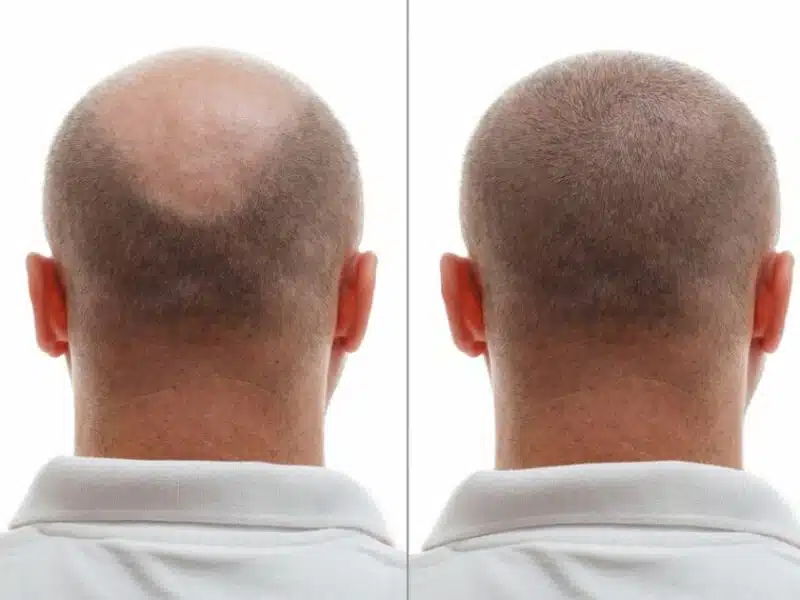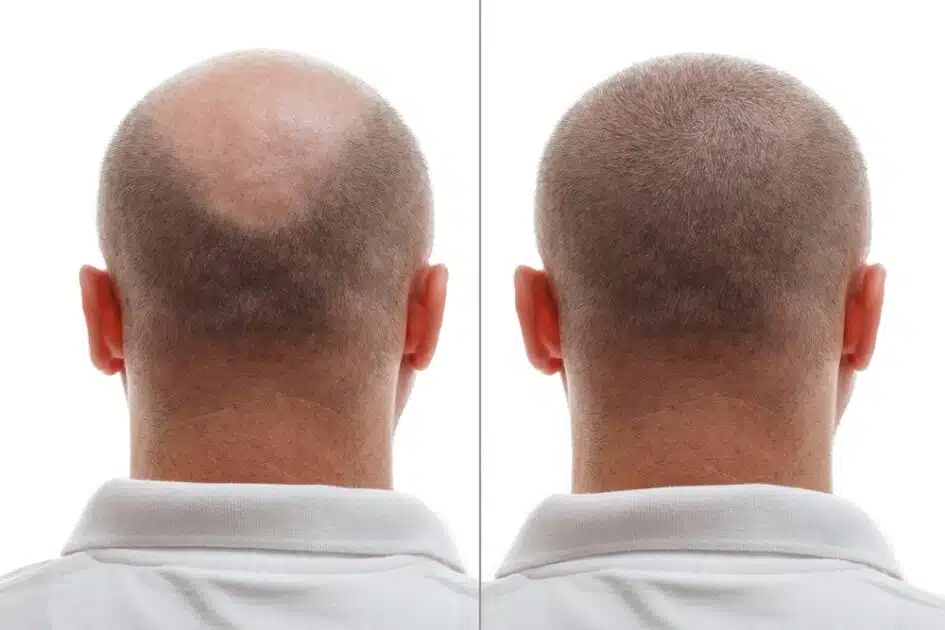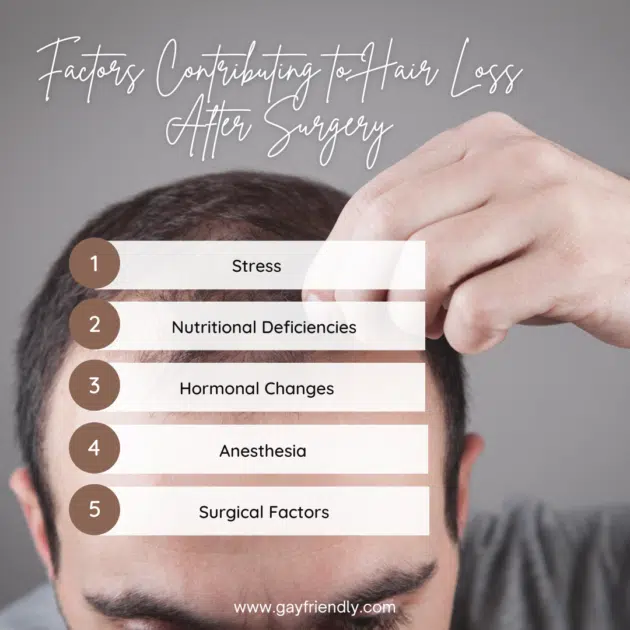Understanding and Managing Hair Loss After Surgery

How To Deal With Hair Loss After Surgery
11th Apr, 2023
Hair loss after surgery is an issue that affects many individuals who have undergone medical procedures. This often unanticipated side effect can be emotionally distressing and negatively impact one’s self-esteem and overall well-being.
As a result, there is a growing interest in understanding the factors contributing to post-surgical hair loss and exploring effective prevention strategies and remedies.

In this comprehensive article, we aim to delve into the various causes of hair loss following surgery, while also discussing measures to prevent and manage this common yet distressing problem.
By providing insights into the underlying factors and offering practical solutions, we hope to empower readers with the knowledge and tools necessary to minimize the impact of hair loss after surgery and promote healthier hair regrowth, ultimately enhancing their recovery journey.
The Hair Growth Cycle and Telogen Effluvium
Understanding the hair growth cycle is essential in comprehending the reasons behind hair loss after surgery. Hair growth occurs in three main phases: anagen (growth), catagen (regression), and telogen (resting).
- Anagen phase (growth): During this phase, which typically lasts between 2-8 years, the hair follicle actively produces new hair cells. The length of this phase determines the maximum length your hair can achieve.
- Catagen phase (regression): This phase is a transitional period, lasting approximately 2-3 weeks, during which the hair follicle begins to shrink and detach from the blood supply. The hair strand is then pushed up towards the surface of the scalp.
- Telogen phase (resting): The final stage of the hair growth cycle lasts around 3 months. In this phase, the hair follicle is in a state of rest, and the hair strand is eventually shed to make room for new growth.
Telogen Effluvium: Temporary Hair Loss Due to Premature Telogen Phase
Telogen effluvium is a temporary hair loss condition that occurs when a large number of hair follicles enter the telogen phase prematurely. This can be triggered by various factors, including stress, hormonal changes, nutritional deficiencies, or certain medications.
When the body undergoes significant stress, such as during surgery, it may cause a disruption in the hair growth cycle. As a result, a higher percentage of hair follicles shift into the telogen phase earlier than usual.
Consequently, individuals may experience a noticeable increase in hair shedding, leading to the temporary hair loss condition known as telogen effluvium. While this condition can be distressing, it is important to note that hair growth usually resumes its normal cycle once the underlying cause is addressed.
Factors Contributing to Hair Loss After Surgery
Surgery can be a significant stressor on the body, with various factors contributing to hair loss during the recovery period. Here are the most common factors associated with post-surgical hair loss.

Stress
Did you know that stress during and after surgery can have a negative impact on your hair growth? Your body prioritizes diverting nutrients to your vital organs during times of stress, which means your hair follicles may not be getting the nutrients they need.
This lack of nutrients weakens your hair strands and could even cause them to stop producing altogether, resulting in hair loss. So, if you want to keep your locks looking luscious, it’s important to take care of yourself both before and after surgery.
Nutritional Deficiencies
As your body heals, it craves fuel that will help it rebuild stronger and better than ever before. This includes nutrients like protein, iron, zinc, and biotin, which are crucial for keeping your hair healthy and shiny.
Without enough of these key elements, your hair can struggle to grow and may even start falling out. But fear not – with the right diet, you can nourish your body from the inside out and enjoy luscious locks that are the envy of all your friends!
Hormonal Changes
Undergoing surgery can have unexpected consequences, particularly regarding hair growth. Women, in particular, may notice changes in their hair due to hormonal fluctuations caused by prolonged bed rest, medication, or stress.
Luckily, there are steps you can take to counteract these effects. By getting back into your daily routine and addressing hormonal imbalances, you can work to restore your locks to their former glory.
Recommended: What are the Signs You Need Hormone Replacement Therapy?
Anesthesia
Though not conclusively proven, some experts believe there may be a connection between anesthesia and hair loss. Lengthy surgeries that require extended periods of anesthesia could potentially slow down cell division, which in turn may affect hair follicle production and lead to hair loss.
Surgical Factors
The field of surgery, scarring, and medications used during the procedure can all impact hair growth. Scarring can cause hair follicles to shut down, restricting new hair growth, while certain medications may have side effects that result in hair loss.
Consulting with your healthcare provider about potential side effects and alternative medications can help minimize hair loss risks.
Other Factors
Infection and positional alopecia are additional potential causes of hair loss after surgery. Infections, whether bacterial, viral, or fungal, can lead to sudden hair loss if not treated promptly. Positional alopecia, though uncommon, can occur when the head is kept in one position for an extended period, limiting blood supply to the skin and hair follicles.
This is typically seen in surgeries lasting more than six hours. Being aware of these factors and discussing them with your healthcare provider can help you better understand and manage hair loss after surgery.
Recommended:
What are the Signs You Need Hormone Replacement Therapy?
Coping with Hair Loss After Surgery: Strategies and Tips
Dealing with hair loss after surgery can be challenging, but understanding the duration and possible remedies can help you manage this issue more effectively. Here are some key points to consider when coping with hair loss post-surgery:
Duration of Hair Loss
It’s essential to understand that hair loss after surgery is typically temporary and usually lasts for a few months. As your body recovers and the underlying causes are addressed, hair growth should gradually return to normal.
How to Stop Hair Loss After Surgery
To minimize hair loss after surgery, consider the following tips:
- Reduce stress by engaging in relaxation techniques, such as deep breathing exercises, meditation, or gentle yoga.
- Maintain a balanced, nutritious diet to ensure your body has the necessary nutrients for hair growth.
- Discuss your concerns with your doctor, who can provide personalized recommendations based on your specific situation.
Best Shampoo for Hair Loss After Bariatric Surgery
When searching for a shampoo to help with hair loss after bariatric surgery, look for gentle, sulfate-free formulas that contain hair growth-promoting ingredients, such as biotin, keratin, or essential oils like rosemary or lavender. These shampoos can help nourish your hair and support a healthy scalp environment.
Natural Remedies for Hair Loss After Surgery
In addition to medical treatments, you may consider exploring natural remedies to support hair growth after surgery. Some options include:
- Supplements: Biotin, iron, zinc, and vitamin D are essential nutrients for hair growth. Consult your doctor before starting any new supplements.
- Essential oils: Adding a few drops of rosemary, lavender, or peppermint oil to your shampoo or massaging them into your scalp may help stimulate hair growth.
- Scalp massages: Gently massaging your scalp with your fingertips or a soft brush can help increase blood flow to the hair follicles, encouraging growth.
By understanding the temporary nature of hair loss after surgery and taking proactive steps, you can better cope with this issue and support your hair’s recovery.
The Bottom Line
Hair loss after surgery is a common concern for many patients. Various factors can contribute to this issue, including stress, nutritional deficiencies, hormonal changes, anesthesia, surgical factors, and other underlying causes. It’s essential to remember that hair loss after surgery is usually temporary and should resolve as the body recovers.
To cope with hair loss, consider adopting stress-reduction techniques, maintaining a balanced diet, using gentle shampoos with hair growth-promoting ingredients, and exploring natural remedies like supplements and essential oils. Most importantly, consult with your doctor to discuss your concerns and receive personalized recommendations tailored to your specific situation.
By understanding the factors contributing to hair loss after surgery and taking proactive steps, you can better manage this issue and support a healthy recovery. Always remember that addressing your concerns with a medical professional is crucial in ensuring the best possible outcome.
Recommended:
How Often Can You Die Your Hair And How To Stop Hair Fall After Colouring















